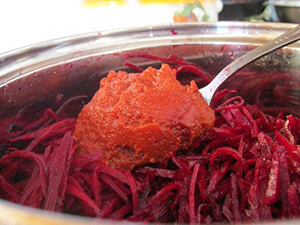The most useful vegetables for the heart and blood vessels
Author Ольга Кияница
2017-12-16

With the development of cardiovascular diseases, many cardiologists immediately draw the patient's attention to the diet. Such actions are not unfounded, because on the basis of multiple studies, the most useful fruits and vegetables were found out. The best vegetable cultures, which strengthen the heart muscle and blood vessels, were beets and tomatoes.
Dr. Vikas Kapil, along with other scientists, conducted a four-week randomized study, during which it was found that juice from beet can reduce blood pressure. For this, one group of patients practiced "beetroot treatment", and the other was considered a control group (placebo).
Patients were in both outpatient and inpatient settings, and in any variant a significant decrease in systolic and diastolic pressure was observed. In this case, patients who took juice depleted with nitrates acted as placebo, while other patients took juice with an approximate nitrate rate of 6.4 mmol / day. As a result, outpatient monitoring of blood pressure confirmed positive changes in people from the study group. In addition, there was a decrease in arterial stiffness and an improvement in the functional capacity of the endothelium, which was not observed in the placebo group.
"Such results are so far unique and they clearly confirm the positive effect of natural nitrates, included in dietary nutrition of patients with hypertension," Dr. Kapil said. "The study has proved the important role of nutritional nitrates, which are readily available to every patient, so they can be included in nutrition and supplement antihypertensive therapy"
The second study concerned all favorite tomatoes. In their composition, lycopene is determined, due to which tomatoes differ in red coloration. The substance is useful in the prevention of various cardiovascular diseases. Hideakatsu Yanai together with co-authors conducted an interventional study, in which tomatoes and tomato products were used. The main task was to understand the antiatherosclerotic effects of tomato, included in functional nutrition. As a result, evidence was obtained of the presence, in addition to the antiatherosclerotic effect, of a number of other tomatoes: anti-obesity, hypotensive, endothelial-improving, antiplatelet and anti-inflammatory. At the same time, researchers noted that the anti-atherosclerotic capabilities of tomatoes depend a lot on the method of preparation.
